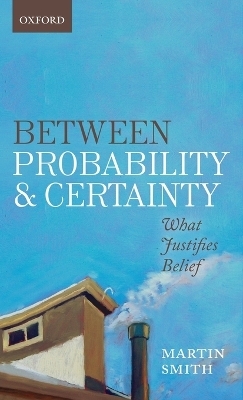
Between Probability and Certainty
What Justifies Belief
Seiten
2016
Oxford University Press (Verlag)
978-0-19-875533-3 (ISBN)
Oxford University Press (Verlag)
978-0-19-875533-3 (ISBN)
Martin Smith explores the question of what it takes for a belief to be justified or rational. He argues that in order to have justification for believing a proposition, one's evidence must normically support it--roughly, one's evidence must make the falsity of that proposition abnormal in the sense of calling for special, independent explanation.
Martin Smith explores a question central to philosophy--namely, what does it take for a belief to be justified or rational? According to a widespread view, whether one has justification for believing a proposition is determined by how probable that proposition is, given one's evidence. In the present book this view is rejected and replaced with another: in order for one to have justification for believing a proposition, one's evidence must normically support it--roughly, one's evidence must make the falsity of that proposition abnormal in the sense of calling for special, independent explanation. This conception of justification bears upon a range of topics in epistemology and beyond, including the relation between justification and knowledge, the force of statistical evidence, the problem of scepticism, the lottery and preface paradoxes, the viability of multiple premise closure, the internalist/externalist debate, the psychology of human reasoning, and the relation between belief and degrees of belief. Ultimately, this way of looking at justification guides us to a new, unfamiliar picture of how we should respond to our evidence and manage our own fallibility. This picture is developed here.
Martin Smith explores a question central to philosophy--namely, what does it take for a belief to be justified or rational? According to a widespread view, whether one has justification for believing a proposition is determined by how probable that proposition is, given one's evidence. In the present book this view is rejected and replaced with another: in order for one to have justification for believing a proposition, one's evidence must normically support it--roughly, one's evidence must make the falsity of that proposition abnormal in the sense of calling for special, independent explanation. This conception of justification bears upon a range of topics in epistemology and beyond, including the relation between justification and knowledge, the force of statistical evidence, the problem of scepticism, the lottery and preface paradoxes, the viability of multiple premise closure, the internalist/externalist debate, the psychology of human reasoning, and the relation between belief and degrees of belief. Ultimately, this way of looking at justification guides us to a new, unfamiliar picture of how we should respond to our evidence and manage our own fallibility. This picture is developed here.
Martin Smith completed a PhD at the Australian National University in 2005 and relocated to the UK in 2006. He is currently a lecturer at the University of Edinburgh.
Introduction: The Risk Minimisation Conception of Justification ; 1. Two Epistemic Goals ; 2. What Justifies Belief ; 3. Justification and Lotteries ; 4. Multiple Premise Closure ; 5. Comparative Justification ; 6. Protection from Error ; 7. Similar Worlds, Normal Worlds ; 8. Introducing Degrees ; 9. Refining Risk Minimisation: The Impossibility Results ; Bibliography ; Index
| Erscheint lt. Verlag | 21.1.2016 |
|---|---|
| Verlagsort | Oxford |
| Sprache | englisch |
| Maße | 154 x 223 mm |
| Gewicht | 406 g |
| Themenwelt | Geisteswissenschaften ► Philosophie ► Erkenntnistheorie / Wissenschaftstheorie |
| ISBN-10 | 0-19-875533-3 / 0198755333 |
| ISBN-13 | 978-0-19-875533-3 / 9780198755333 |
| Zustand | Neuware |
| Haben Sie eine Frage zum Produkt? |
Mehr entdecken
aus dem Bereich
aus dem Bereich
die Grundlegung der modernen Philosophie
Buch | Softcover (2023)
C.H.Beck (Verlag)
CHF 25,20
Buch | Softcover (2023)
Reclam, Philipp (Verlag)
CHF 9,80

![Was heißt Denken?. Vorlesung Wintersemester 1951/52. [Was bedeutet das alles?] - Martin Heidegger](/media/113619842)
